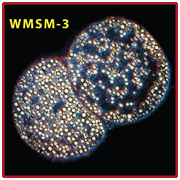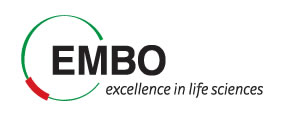

Contact information
WMSM-3 Secretariat
Department of Biotechnology
Delft University of Technology
Julianalaan 67
2628 BC Delft
The Netherlands
T: +31 15 278 4169
F: +31 15 278 2355
E: WMSM-3-BT@tudelft.nl
WMSM - 3
EMBO Workshop on Microbial Sulfur Metabolism
April 15 - 18, 2012, Noordwijkerhout, the Netherlands
Department of Biotechnology of the Delft University of Technology
Introduction
Sulfur is one of the most abundant elements on Earth. It is mainly present as pyrite or gypsum in rocks and sediments or as sulfate in seawater. The sulfur cycle is complex, because of the different oxidation states and because sulfur can be transformed both chemically and biologically.
The sulfur cycle plays an important role in the biosphere. Sulfur is present in the amino acids cysteine and methionine and in cofactors, such as biotin and coenzyme A. In addition, microorganisms may use sulfur in their energy metabolism. Some anaerobic bacteria and archaea can use sulfate as a terminal electron acceptor for the oxidation of organic substrates, while other bacteria can use the reduced sulfur compounds as electron donor for aerobic respiration or anaerobic respiration with nitrate. Chemolithoautototrophic bacteria are highly specialized in sulfur biotransformation, but a large variety of heterotrophic bacteria is also able to oxidize inorganic sulfur compounds. Some phototrophic bacteria use sulfur compounds as electron donor in the reduction of carbon dioxide to biomass.
The environments in which sulfur bacteria thrive are diverse. Besides in soil, sediments and surface water, sulfur bacteria can be found in environments with a low or high pH and/or temperature. In addition, they can be found in the deep biosphere.
Sulfur conversions are also important in biotechnology. Sulfate reduction may be used to precipitate heavy metals as metal sulfides, while sulfate reduction coupled to partial oxidation of sulfide to elemental sulfur can be used to recover sulfur from wastewater and off gasses. Apart from beneficial applications, sulfate reduction is associated with anaerobic corrosion, which causes large problems in industrial processes.
The EMBO Workshop on Microbial Sulfur Metabolism treats the current state-of-the-art of different aspects of the microbial sulfur cycle, including:
• Sulfur bacteria and their niches
• Physiology, biochemistry and genomics of sulfur bacteria
• Geochemistry and evolution
• Novel sulfur biotransformations
• Microbial interactions and symbiosis
• Biotechnology of sulfur bacteria
Former WMSM Workshops :
-
WMSM-2 (Tomar, Portugal), 2009
- WMSM-1 (Munster, Germany), 2006
